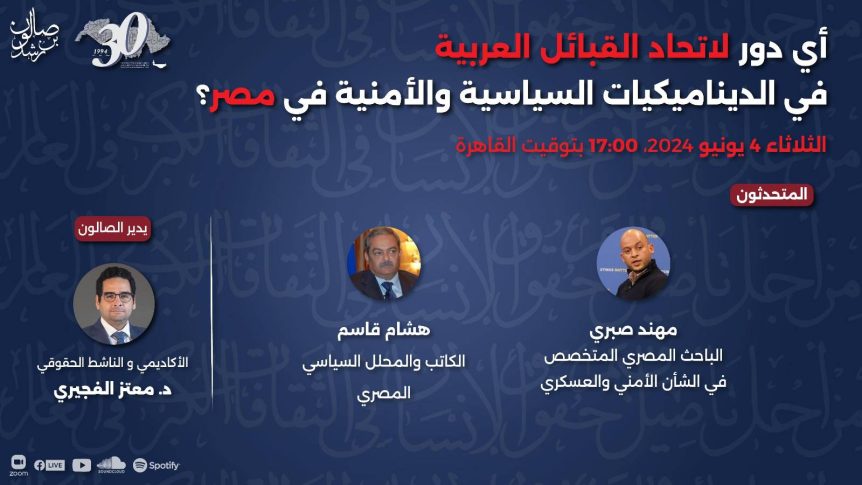On Tuesday, 4 June 2024, the Cairo Institute for Human Rights Studies (CIHRS) held a seminar as part of the monthly activities of Salon Ibn Rushd, titled ‘What is the role of the Arab Tribes Union in the political and security dynamics in Egypt?’ The salon hosted writer and political analyst Hisham Kassem, a member of the Board of Trustees of the Free Current, and Mohannad Sabry, a researcher in Egyptian and the Sinai Peninsula security and military affairs, and was moderated by academic and human rights defender Moataz el-Fegiery.
Researcher Mohannad Sabry began the discussion by addressing that the Arab Tribes Union is not a new entity, but has been registered since 2011. Recently, Ibrahim al-Organi seized authority of the union with power, influence, and relations with the state, and re-branded it in a new guise. Hisham Kassem described this act as part of a ‘major corruption deal’. Kassem added that al-Organi’s history proves that he is merely a front for a huge and frightening amount of money and business that he does not own. Kassem continued that the union is merely a tribute to al-Organi for being a loyal and obedient front for the state apparatus, and an attempt to grant himself social status.
However, Sabry affirms that the real danger of this union in its new form lies in the state’s involvement, in the midst of a critical security situation, in selecting suspicious individuals and entities and giving them special privileges and qualities to operate outside the scope of the rule and responsibility of official institutions, and under an umbrella of legal protection. Sabry warned of the consequences not only of fragmenting the societal fabric and sowing discord, but further eroding the reputation and image of security and sovereign institutions in the eyes of the Egyptian people, regionally and internationally. Sabry further warned of the danger of these entities and individuals to the security institutions themselves. He noted that Ansar Bayt al-Maqdis was originally formed by a few individuals, some of whom were detained in the same prison as Ibrahim al-Organi. He continued that the only difference perhaps being that al-Organi decided to side with the security services and head a ‘fragile entity controlled by orders,’ while Ansar Bayt al-Maqdis decided to take revenge on them, resulting in ten years of terrorism in Sinai.
Hisham Kassem described the current regime as a ‘crisis regime,’ as its over decade-long mismanagement has caused a protracted series of political, social and economic crises. Kassem described the scandal of al-Organi’s Hala Company, and its authorization by the current regime, as a black spot in Egypt’s history. Kassem ruled out that this current regime will open any serious investigation, describing the official position as shameful. Kassem said, ‘I don’t think there has ever been an incident of blackmailing people seeking refuge in one country to escape massacres committed by an army on the other side, this is a new precedent in the whole world, not just in Egypt’.
The regime’s silence on this scandal, Kassem explained, is due to the fact that the Hala Company is a front for influential people in the Egyptian state. He added that such crimes and the Egyptian regime’s tolerance of them have encouraged Israel to accuse Egypt in the Court of Justice of cutting off aid to Gazans, ‘When we (Egyptians) are standing at the border crossing, taking royalties from them (Gazans)!’.
As for the impact of this union on the popular base of the current regime, especially among the Arab tribes in Egypt, the two speakers emphasized that it has no value and may even have a negative impact. The speakers continued that in fact numerous tribal leaders do not consider the union or Organi to be their representative, and the tribes are present and extended throughout Egypt and have a central weight in many governorates, not just Sinai. Sabry warned of the impact of this union in sowing discord among the tribes, amid the violent and prolonged treatment by the state and security services over the past ten years, which has created ‘a class of people who benefit from this violence’. Sabry noted that the Sisi regime ‘still has a huge stockpile of violence, and will not hesitate to use it against the entire society, whether through the army and police services or through intermediaries, including the Sinai Tribes Union and others’.” This situation poses a question: is the regime ‘aware of the gravity and consequences of its actions’?
Watch the full webinar:
Share this Post

